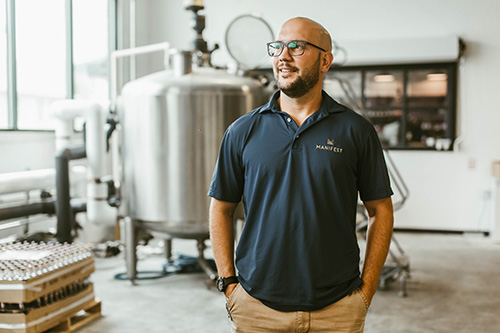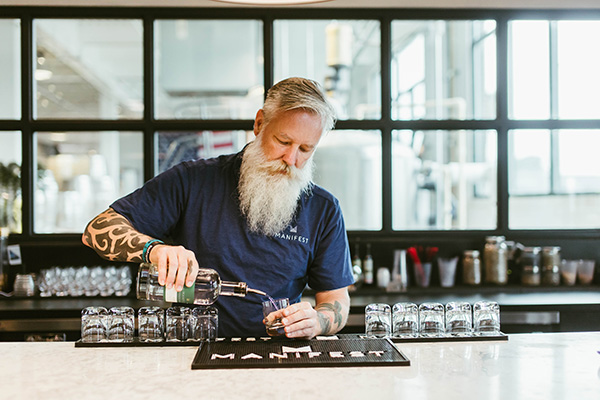 Why Manifest Distilling’s success goes to the team and its unity
Why Manifest Distilling’s success goes to the team and its unity
By Michael J. Pallerino
Unity. If you are looking for the guiding principle driving the Manifest Distilling vision, that is where you will find it. When the Manifest team—David Cohen head distiller and president, partners Scott Kennelly, Trey Mills and Tom Johnson—talk about what continues to drive the Jacksonville, Florida spirit brand forward, they talk about each person’s contribution to the cause.
Mills and Johnson have taken all the qualities of American craftsmanship—the grains, its network of co-ops across the country and those spirits, don’t forget the spirits—and turned Manifest Distilling into Jacksonville’s only organic distillery. Nestled in the revitalized downtown area near the
baseball grounds and the Veterans Memorial Arena, Manifest continues to make it presence known in the spirits world.
Cohen transitioned into the distillery business after spending years in film and publishing, even attending the highly touted brewing school “The Siebel Institute” in Chicago, where he became a fixture in distilleries around the Windy City and in Kentucky.
Living on the fringes of his dream, he learned the distilling craft, eventually heading back home to Jacksonville to kick things off. With an eye for
sourcing the best ingredients, he focused on creating an organic brand defined by high quality.
To get an inside look at how the Manifest team creates its magic, CBAM sat down with Cohen (DC), GM Jim Webb (JM) and lead distiller Mike Mullis (MM).
Give us a snapshot of today’s craft distilling market from your perspective.
DC: It is split between people trying to guess the next big thing and simultaneously trying to catch up with the current big thing. The other half are the purists, who have a very clear vision, deep sense of community and do it because it is their passion.
JW: It really burgeoned about four years ago and is coalescing as the market becomes crowded with quality products.
MM: Locally, we are seeing more and more distilleries opening, much along the lines of the space years ago. A scene is being created that will force us to all keep up our game. What’s great here in the north Florida market is that each local distillery has a unique personality.
What are some of the trends you see shaping up for 2020?
DC: Carrying forward with the split analogy, one side pushing the envelope with flavored and ready to drink (RTD) beverages like spiked seltzer, peanut butter whiskey, and the other side, an evolving maturity of aged product that is now old enough to be competitive with the major national brands.
JW: More and more quality craft products are hitting the market. The industry is maturing.
MM: We are hitting our four-year mark, which is allowing us to release more aged products. We are also still experimenting with small batch releases. We released a small batch brandy last year that sold out almost overnight, so am looking forward to larger batches next year. We are also working on some single malt whiskey projects.
Were there any surprises this year?
DC: With respect to Manifest, we saw the same levels of growth in our first year continue through our third year, due to an emerging cadre of fiercely loyal customers. We also welcomed the acceptance of craft into the major chains here in Florida.
JW: The renewed presence of the re-energized Florida Craft Spirits Guild was a welcome addition to the marketplace here.
MM: We released our first 100% rye mash bill, and we should have made more of it. Come back in two to four years when the next barrels are ready.
What is the Manifest Distilling story from a brand perspective?
DC: There was extreme attention paid from the beginning to a perspective, through bottle and label production. This stems from strict brand guidelines, to an unrelenting quality control process.
JW: Everyone who is involved with MD is both an employee as well as a brand ambassador. No joke, but we all have drunk the Kool aid and are in this passionately.
Walk us through your branding strategy.
DC: Consistency. Both in product design and product quality. Our strategy is very similar to our overall mission. Manifest embodies the belief that something can truly be created from nothing. And we are greater than the sum of our parts, which has shown through hospitality, consistency (again) and a desire to deliver a world-class product.
What’s the biggest issue today related to the marketing/sales side of the craft distilling business today?
DC: In Florida, it is draconian regulations preventing craft distilleries from building their brands by selling and engaging directly with the consumer.
JW: We are pretty much the only industry that cannot sell its products directly to its consumers due to these post-prohibition era laws.
What is the secret to creating a branding story that your consumers can buy in to?
DC: Simple: Be authentic. People love a good story and want to know the people behind that story. A brand can only be as good as those elements.
JW: It is all about relationships and making your customer feels that he or she is a personal and integral part of your brand.
MM: We create a local product that is more so a quality product. Local gets us in the door, the quality keeps us there. And each batch we do is even better. I can’t wait to see what the next five years bring us.
What is the one thing every craft spirit brand should be doing in the way of marketing?
DC: Be transparent. The consumer is savvier than ever and will ultimately see the truth behind any puffery.
JW: Engaging locally, but always with an eye to expansion regionally. The rest will grow organically.
MM: Showcase local collaborations. When two local brands can work together, they both benefit far more than just working on islands.
 What do you see as some of your biggest opportunities moving ahead?
What do you see as some of your biggest opportunities moving ahead?
DC: Deeper penetration into the Florida market outside of our home area here in Jacksonville, plus expansion into the Southeast region of the US.
JW: Incorporating more events at our distillery over the last two years has driven customer engagement to new levels.
MM: Getting our product out there to more people. We make a great product and getting that product into more markets is key. Three years ago, we were only producing a couple barrels of whiskey a month. Now we have multiplied that production and consumer response has been increasing.
What’s the biggest item on your to-do list right now?
JW: Getting through the holiday party and event season.
MM: We are about to start the bottling of two new products, so balancing the time spent there with the regular day-to-day operations.
How does your tasting room space integrate into your branding/marketing strategies?
JW: It is our direct customer focal point. Again, it goes back to brand guidelines.
Does music and/or other arts play a role in your overall brand strategies?
JW: We directly support several local charitable arts and cultural organizations. We have created unique artist series bottles for the Jacksonville Area Cultural Council, as well as for The Stage Fund, an organization supporting the performing arts.
MM: Does our bi-annual Gin & Juice Party count?
DC: We are always looking for ways to engage and give back to our community. We are local, and support many local arts and cultural organizations through events, direct product donations and collaborations.
